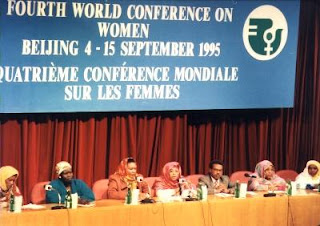Twenty years after the Beijing Declaration, progress in gender equality are still very limited. Twenty years after the adoption of the Beijing Declaration in 1995, especially in positions of greater power. At the rate of two decades, women take over 200 years to reach parity, understood as neither of the two sexes have a less than 40% or greater than 60% presence. This means that 58% of men and 42% of women and an equal proportion would be considered. Well, no way. The sixth edition of The World's Women Report, United Nations, shows that progress is very slow and remain large pockets of inequality, starting for only 50% of women of working age have a job, compared with 70% of men.
The lack of parity occurs at all levels, but is more pronounced the more scale in the pyramid of power, whether political or economic. And especially at the top. In 1995 there were 12 women prime ministers or heads of government. Now they are 15. It is true that among them is a woman with as much power as Chancellor Angela Merkel, and that three of the main countries of Latin America-Brazil, Argentina and Chile are governed by women. You may even soon the greatest world power with permission from China, which is the United States, may be governed by a woman if Hillary Clinton continues her career smoothly. But 15 among 149 countries can not be called a breakthrough. The proportions are not very different in governments and parliaments: only 18% of ministers and 22% of parliamentarians are women, although there are now some governments, such as Norway, completely joint.
What about the private sector? In business, the situation is even worse. The Danish series Borgen has a very enlightening chapter on the resistance encountered by women when they want to govern the accelerator, for example, imposing quotas on the boards of companies. Viviane Reding also have much to explain about his failed attempt to impose attempt at European level. The obstacles are not just men. These tend to retain their share of power, of course. But this lack of progress also influences, and much, a type of social and labor organization based on outdated schemes, when men were engaged in the public sphere and women in private.
To this we must add that competitive conditions operating in the most dynamic companies involve costs in terms of commitment and dedication that are not acceptable for women to work also want to have a family, attend to and enjoy. Even the most demanding and better educated just giving up. The sociologist Pamela Stone refers to it as "forced resignation" a factor that many presidents and CEOs to justify Castle has just women managers in their companies. If you do not change the structural conditions, in 20 years we will be beaten.








0 komentar:
Post a Comment